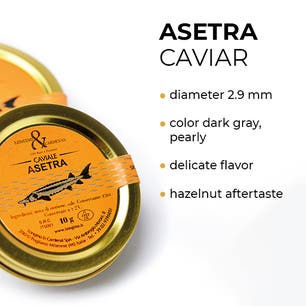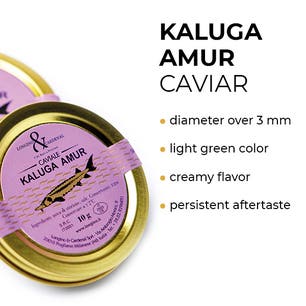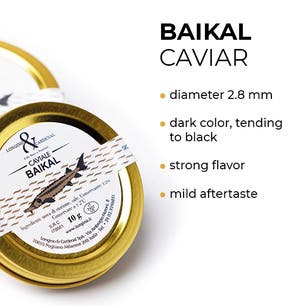Sturgeon Farming
CAVIAR
Sturgeon farming: between environmental sustainability and haute gastronomy
Sturgeon farming is an age-old practice that has ancient roots in Eastern Europe and has spread throughout the world. Today, sturgeon farming is a very important activity for caviar production and for the conservation of endangered sturgeon species.
Sturgeon farming is a practice that requires a lot of care and attention, but it can bring great economic and environmental benefits. Thanks to caviar production, sturgeon farming has become a real industry in many countries around the world. In addition, many sturgeon species are threatened by water pollution and overfishing, and farming can contribute to species reproduction and conservation.
In a sturgeon farm, animal welfare is a top priority. Sturgeons are very sensitive and delicate fish, and they require special care to grow healthily and produce quality eggs for caviar production.
To ensure the welfare of sturgeons, water must be kept clean and oxygenated. Modern fish farms use sophisticated water filtration and recirculation systems to maintain the quality of the environment in which the fish live. In addition, it is important to regularly check pH and nutrient levels in the water to ensure a healthy environment for sturgeons.
For sturgeon nutrition, farmers use a specific diet of fish and crustaceans, supplemented with vitamins and minerals essential for fish health. It is important to provide adequate amounts of food to sturgeons, but also to avoid overcrowding of breeding ponds to prevent health problems among fish.




The stages of sturgeon breeding
Raising sturgeon is a process that requires great care as these fish are known for their longevity and delicacy. The first stage of sturgeon rearing is spawning. Sturgeons are oviparous fish, which means they lay eggs in the water and then fertilization takes place. Sturgeon reproduction occurs naturally in nature, but in breeding, the technique of hormone induction is often used to control reproduction and ensure maximum efficiency of the process. Once the sturgeons have spawned, the eggs are collected and transferred to special tanks for the next stage of rearing.
The next phase of sturgeon rearing is the growth phase. The eggs are incubated in special tanks for a period ranging from a few days to several weeks, depending on the sturgeon species and environmental conditions. Once the eggs hatch, baby sturgeons, which are called fry, are born. The fry are fed specific foods for development and growth, such as plankton, and are kept in separate tanks to avoid possible disease or predation. During this stage, the fry grow very rapidly and reach the young sturgeon stage after a few months.
The next stage of sturgeon rearing is the maturation stage. Once the young sturgeons have reached a certain size, they are transferred to larger tanks and fed a specific maturation diet. During this stage, sturgeons reach sexual maturity and begin producing eggs. Sturgeon maturation varies by species and environmental conditions, but generally occurs between the ages of 7 and 15 years.


The delicate process of caviar production
Sturgeon farming and caviar production are very important economic and environmental activities. However, it is important to emphasize that sturgeon farming and caviar production must be carried out in a sustainable manner to preserve endangered sturgeon species and to ensure the highest quality product. In many countries around the world, sturgeon farms are subject to strict regulations to ensure compliance with environmental standards and the quality of the final product.
Once sturgeons reach sexual maturity, they begin producing the eggs that will give rise to caviar. Sturgeon eggs are very delicate and require special care during production to ensure the highest quality caviar.
The first stage of caviar production is egg collection. The eggs are taken from the sturgeons and then washed thoroughly to remove any impurities. At this stage, the delicate texture of the eggs requires special care to avoid damaging them. The eggs are then carefully salted to ensure the right balance of taste and preservation.
After salting, the eggs are left to rest for a few days so that the salt can fully penetrate the surface of the eggs. During this time, the typical grayish patina forms on the surface of the eggs. Once the resting phase is over, the eggs are washed again to remove excess salt and to give the caviar the proper flavor.
The final stage of caviar production is packaging. Caviar eggs are packaged in jars or boxes and then refrigerated to preserve their freshness. During storage, it is important to keep the caviar at a constant temperature to prevent spoilage.


Longino & Cardenal, pioneers of caviar in Italy
Caviar is a prized food known for its unparalleled qualities. There are several species of sturgeon that produce the world's most prized and famous caviar, such as Beluga, Asetra, Baikal and Kaluga Amur. Longino & Cardenal, back in 1988, was the first Italian company to import fresh caviar from Iran, obtaining authorization to distribute and repackage the caviar in Italy through "number 1" license IT0001. The success of Longino's Iranian caviar was immediate, but with fishing banned in the Caspian Sea to avoid sturgeon extinction, the company found an exceptional alternative: caviar from China, specifically from the waters of Lake Qiandao in the state of Zhejian. In this enchanting place, sturgeons are naturally fed and raised in floating nets, ensuring the highest quality of the caviar produced.
Beluga caviar is considered the rarest and most valuable because of the slow maturation of the Huso Huso sturgeon, which leads to waiting many years before the female can lay her first eggs. Asetra caviar, on the other hand, is characterized by its distinctive nutty aroma and crispier texture than other types. Baikal caviar is smaller in size but has an intense and pleasant flavor, while Kaluga Amur caviar is a favorite among chefs for its mineral taste and green and golden hues.
Discover the products
Longino & Cardenal
Longino & Cardenal stands today as one of Italy's leading "food globetrotters." With passion and courage it carries out a continuous search for the best raw materials, often little known to most, in order to meet the new trends in consumer behavior that seek excellent products proposed in innovative forms. Delivery of products is expected in 48/72 hours from the order if the product is already in stock. All our deliveries use specialized, refrigerated couriers.






